From the Heart
The last two years have been challenging (to say the least) for all of us! In fact, it’s probably been the most difficult time we’ve experienced in 25 very demanding years of operating the Philip Hayden Foundation (PHF). In spite of this, our primary focus has remained on orphans, whose needs have changed but haven’t disappeared. Thankfully, China’s official policies regarding the care of orphans have steadily improved through the years, bringing many more resources to orphanages – especially access to good medical care.
Funding through the Chinese government’s Tomorrow Plan helps orphans with treatable medical conditions get the care they need. However, some policies limit the kind of help that’s offered to children in crisis, and that’s when kids really need an advocate. PHF continues to meet the many requirements of a registered charity in China, so we can be that advocate for orphans with no voice. We must continue to abide by these policies to maintain good favor and be a blessing to those we serve.
Most Orphans in China have Disabilities
Nearly all the orphans in the Child Welfare system have disabilities, so primary caregivers are routinely asked to do more with less. Consider the daily care of a special-needs child – just bathing, getting dressed and eating breakfast are complex activities that can take the entire morning. A child with certain disorders – like CP or spina bifida – requires much more time from a caregiver than a healthy child does, and that expense of time doesn’t decrease with age. By law, the number of children that a caregiver can supervise has decreased, so more caregivers are needed for the same number of children.
The core mission of the Philip Hayden Foundation is “Providing medical care, therapy and education for at-risk children with disabilities, transforming hopelessness into lives of dignity, fulfillment and value.” PHF is committed to helping improve the lives of orphans wherever they are, and in the past two years our team has continued to search for new opportunities to serve.
Help for Orphans Continues
PHF has hosted groups like Angel Babies (a Chinese NGO that provides resources for severely burned children) for weeklong camps, and also increased our outreach to disabled adults, teaching them critical life and vocational skills. We don’t do this alone. Your donations make it all possible – like providing the resources for creating a remote learning class for therapists through our partnership with LIH Olivia’s Place; allowing the 7Acres Campus to be used for a Field Day for orphans with World Vision; and hosting a weeklong camp for Angel Baby families.
Thank you for your continued support as we follow every opportunity to help orphans be seen, known and loved. You’ll be the first to know as we commit to new paths and partnerships to improve the lives of orphans in China.
Awake to Sensory Awareness Month
Did you know that you actually have seven senses? We’ve all learned about the five senses: sight, hearing, smell, taste and touch – which help us understand the world around us. In the 1970s, Dr. Ayres introduced the idea of two more senses, vestibular and proprioceptive.
Vestibular Sense and Proprioceptive Sense
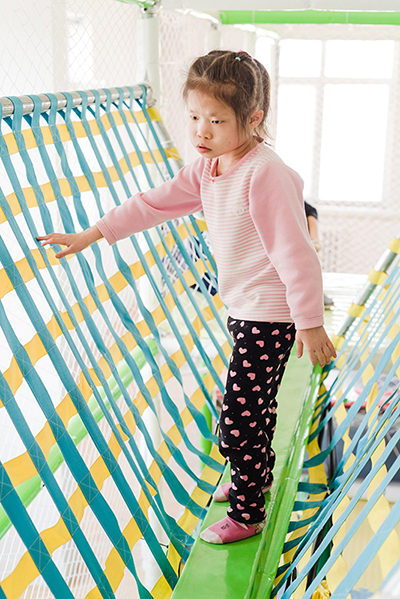
Vestibular receptors, located in the inner ear, help with balance and movement. They enable us to ride a bicycle, spin in a circle without falling over, and even walk in a straight line. The proprioceptive sense, also known as the body sense, tells the brain where the body parts are in space. It’s how we can take a bite of an apple without looking at it, or keep from bumping into other people in a crowded room.
The Brain and SPD
The brain routinely gathers, organizes and responds to all of the sensory information around us. This is an incredibly complex task, but we barely notice it happening. Most of us have senses we rely on more than others, and that’s normal. Some people have much sharper senses of taste or smell, while others enjoy 20/20 vision. However, when the brain is malfunctioning to the point of affecting our daily living, it’s called Sensory Processing Disorder (SPD).
SPD can affect just one sense – like hearing – or several simultaneously. A person might have overactive senses, underactive senses or both. SPD can also cause a child to seek certain sensory experiences – or avoid those experiences – and can sometimes show up with other disorders like ADHD or autism. The great news is that SPD is treatable.
Overactive Senses
When a child has overactive senses, it’s difficult to interpret all the stimuli of the world. For example, have you noticed a child covering her ears because ‘it’s too noisy,’ when it’s actually quiet? Sometimes the brain doesn’t know how to sort out sounds – so a dripping water faucet might seem as loud and important as someone talking face-to-face. A child with overactive senses will want to avoid those experiences, and may curl up or cover her head. If not, this kind of sensory overload can easily spark a violent tantrum – but the deluge of sensations is often so overwhelming that a child just can’t cope. The only response available to them at that point is explosive. Effective treatment works on calming down, or regulating the body’s response to excessive sensory input.
Underactive Senses
Conversely, when the brain doesn’t give enough attention to a sense, it’s also debilitating. Have you ever noticed a child running his hand along the wall as he walks down a hall? It may be so he knows where his body is, in space. This child may also be wiggly, and love to jump or wrestle, or if his sense of taste is underactive, he might just love spicy or sour food!

Everyday activities can be hard and scary for people with SPD. However, it’s not a disease – it’s a disorder, so therapy can be effective. Children can begin to understand why they’re so uncomfortable, and how to ask for help. Calming music and fidget toys can bring focus and concentration, and can be effective soothing techniques. A child might use chewable jewelry to satisfy oral cravings, or do push-ups and jumping jacks for physical stimulation. Some therapists use a deep pressure approach, using compression – or weighted – clothing. In fact, there are many therapies available, and PHF utilizes the best to foster a safe, loving, creative environment for our kids.
Bright Stars Therapy Changes Lives
Many of the kids at Shepherd’s Field needed help processing sensory information. Kids learn better when they are not distracted by the world around them.
Oral Stimulation
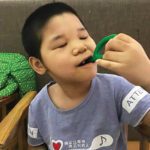
We are used to seeing infants and toddlers use a pacifier to calm themselves. Some kids do not outgrow this need for oral input to calm their bodies. You provided many kids with “chewies”, which are specially designed objects for kids to chew on to calm themselves. Xander, Beth, and Graham all benefitted from chewies.
Tummy Time to Improve Body Awareness Sense and Core Stability

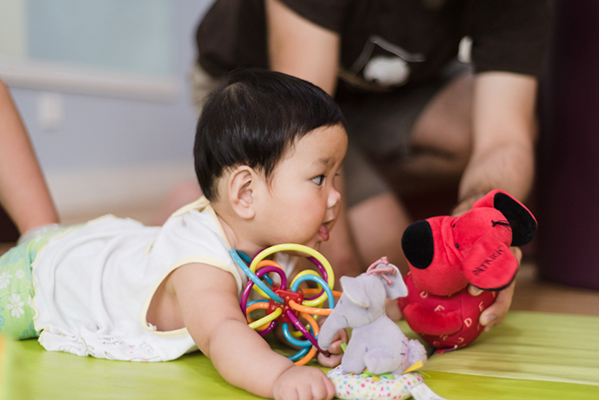
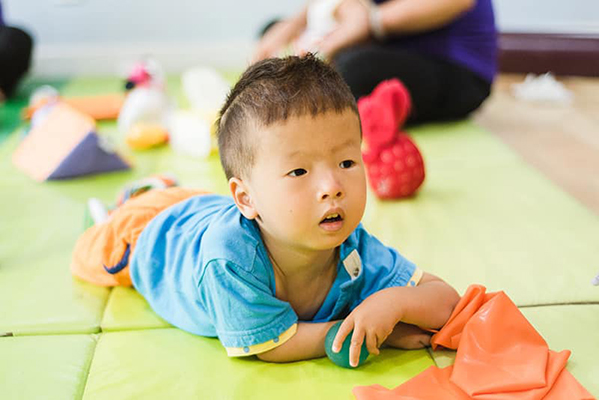
Did you know that tummy time is crucial for developing the body awareness sense? If body awareness is underdeveloped, it will affect gross motor skills, fine motor skills, and eating. Our therapists worked with many of our kids to encourage them to spend time on their tummies by making it as fun as possible.
Bright Stars Therapists Use Swings for Stimulating and Calming
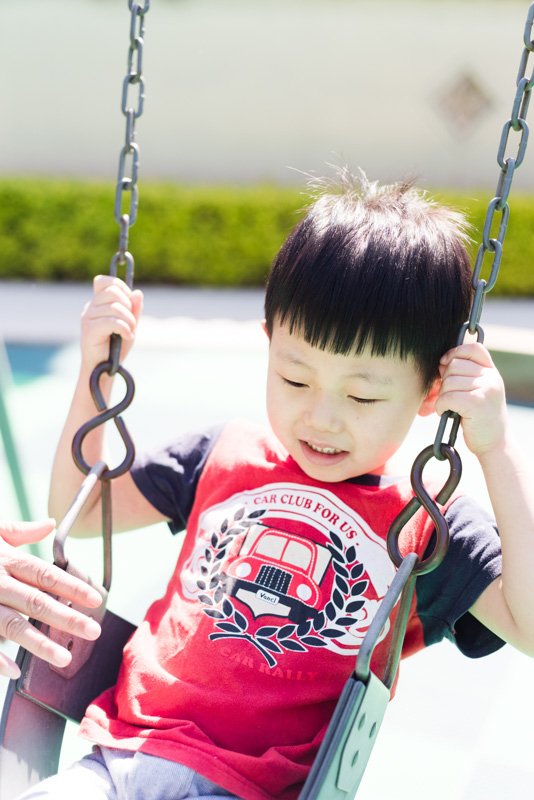
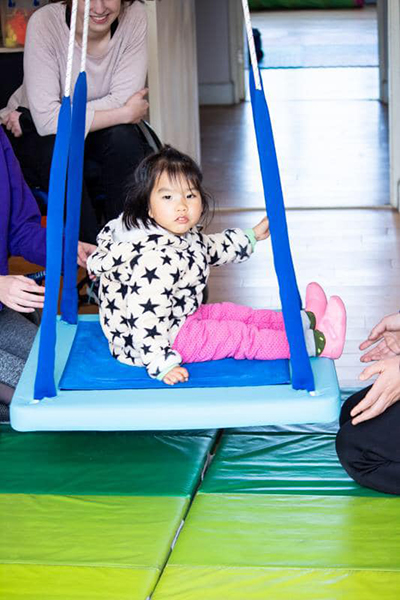
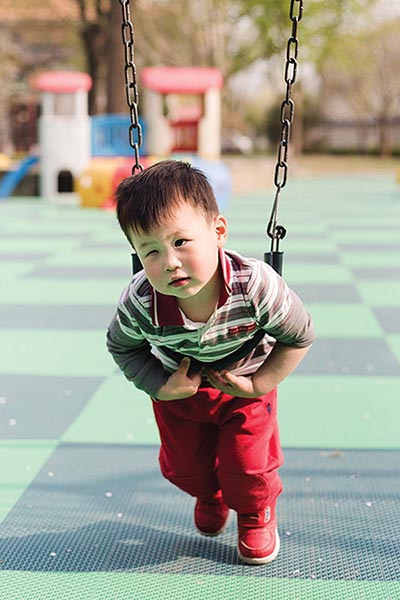
Our therapists used our indoor and playground swings to improve sensory processing and to help children calm their bodies. Swings can improve balance sense and takes lots of practice.
Sensory Processing Disorder Affects Feeding and Eating
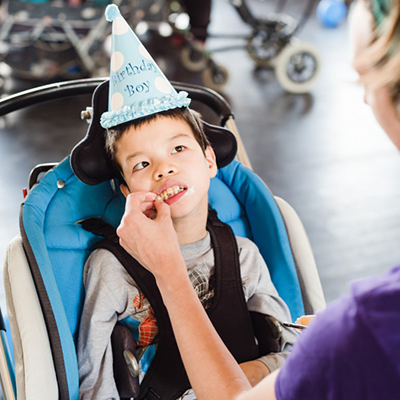
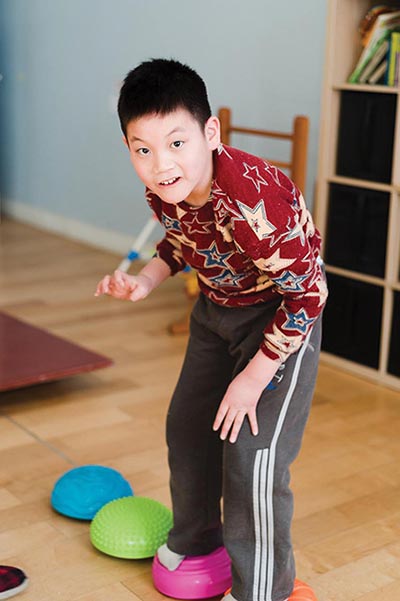
As Leonard learned to chew food, our Occupational Therapist carefully chose foods with the right amount of flavor and crunch to encourage chewing and swallowing. Both overactive and under active senses can affect eating and feeding. Samuel is working on balance and body awareness. Kids with underdeveloped body awareness can fall or crash into things. Improving the connection between the brain and the senses helps keep kids safe.
Update on Hanna
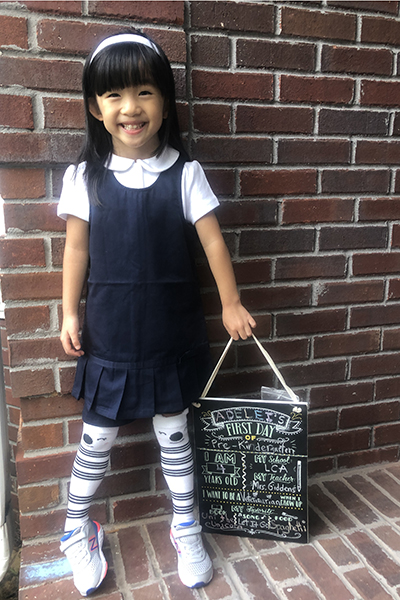
Hanna was at Shepherd’s Field Children’s Village from May 2017 to August 2018 and appeared in several issues of Heartbeat. Her forever family thought you would enjoy an update on this sweet girl.
“We’re happy to report that Adelei Behnke celebrated her fifth birthday on September 18, and started school for the first time! She’s super sweet, smart, kind, gentle and exceptionally brave and resilient. We adopted her in December 2018, the week before Christmas – and so it’s coming up on three full years this fall. Since that time, she’s had corrective open heart surgery for her Tetralogy of Fallot, a complication from heart surgery that landed her back in the hospital for even more time, and four heart catheterizations.
“But God is so good and faithful – at her most recent appointment, the cardiologist said it may be years before another intervention is needed. She continues to do well, and loves her new Italian greyhound puppy Figment, in addition to dinosaurs, horses, cooking, music, unicorns, cheetahs, bananas and princesses. Her favorite Bible story is the parable of the lost sheep.
– Elena Behnke
We Want to Hear From You!
Because China is closed to visitors, we are missing your stories! Ask us a question or share your current passion for orphans in China. Look on Facebook, on our website at chinaorphans.org/get-involved or in your email inbox for opportunities to answer surveys or questions. To share a story or ask a question, direct message us on Facebook or email Lori and Ally at media@chinaorphans.org
You can be sure we will not share your comments and stories without your permission. What you share with us can help shape our future changing the lives of orphans in China.
Access Your Account Online
Great News! We have updated our online donation system, and you now can access your account online. For your security, you will need to request access through a link on our website here. You’ll be asked to provide your email address, and a link will be sent to you. For your security, that link is only good for 24 hours. But you can access your account as often as you want.
Use your self-service page to:
- Update your physical address
- Update your email address
- Change your online donations
- View your donation history
- Print receipts for past donations
If you have any questions, please email Lori.Baxter@chinaorphans.org.
